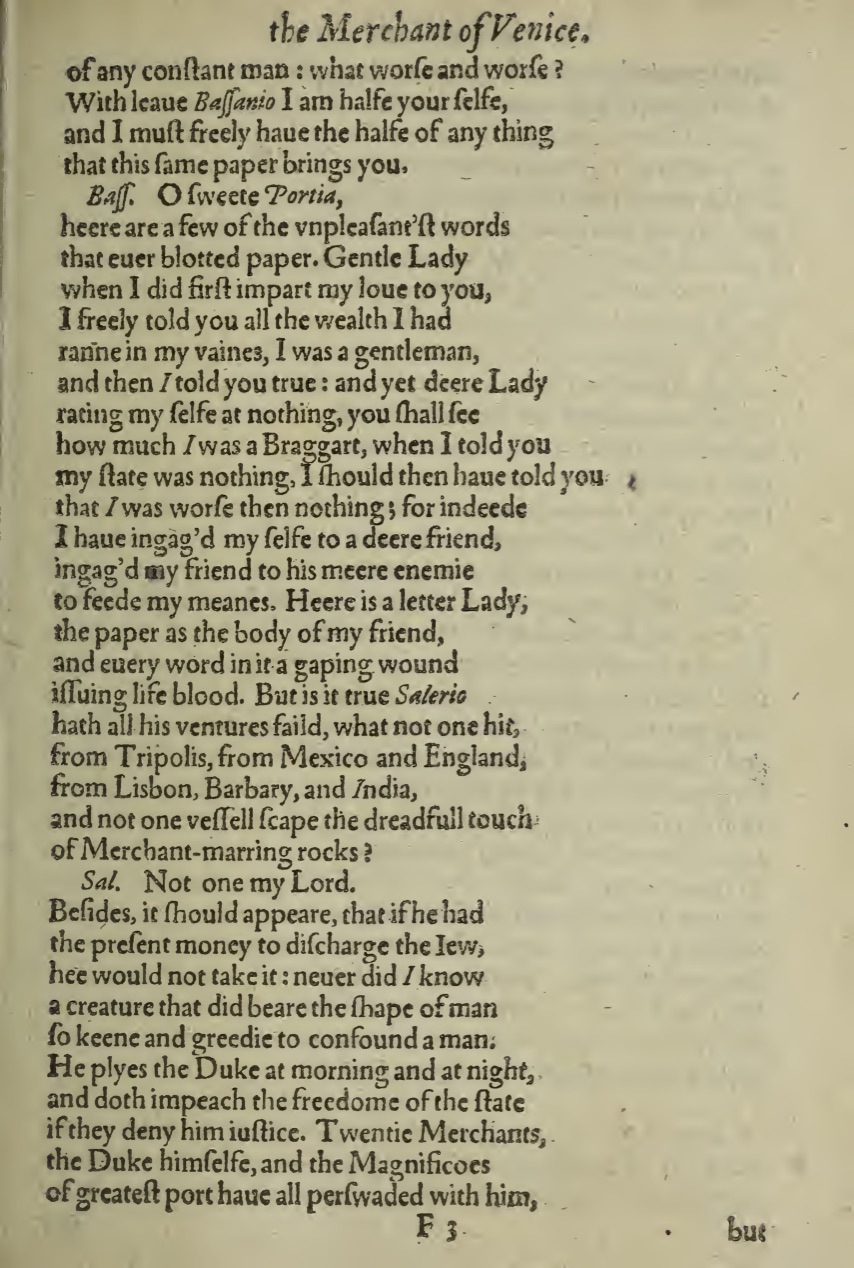Editorial note
The primary goal of this edit was to accentuate the strong imagery provided by the original text. Even taken out of the greater context of the scene and act, the language of this page comments on the emotions of and relationships between characters. Many non-scholarly readers would easily overlook these features, but noticing them enriches the reader's interpretation of the play. Because this edit is meant to enhance the source text instead of re-interpreting it, the transcription has been preserved. The only exceptions to this are rectifications made for the Early Modern typographical conventions; the long s (ſ) has been replaced with a modern 's' and the letters 'u' and 'v' and have been exchanged when appropriate. These changes increase the readability of the edit with minimal corruption to the original craft of the language.
There are many formatting edits that have been made. Following Portia's description that she is 'halfe [Bassanio's] selfe', the lines of these two characters have been separated into parallel columns. Portia's column does not fill the entire left side, and that is because Antonio still occupies a large portion of Bassanio's heart. The word 'freely' is colored blue to highlight Portia's and Bassanio's parallel use of the word. Several words that allude to blood and wounds are bolded and colored red, just as Bassanio describes the 'gaping wound[s]' of every word in the letter he was given. The occurances of the word 'nothing' have been faded into the background to draw attention to their repeated presence. These disappearing words are also contrasted to Bassanio's description of his past self as a 'Braggart', as that line has been separated by an extra paragraph space. The locations describing where Antonio's ships have sunk have likewise been sunken into their lines of text. Lastly, each pronoun referring to Shylock has been made into glitchy text, which both indicates the malevolence with which the speaking characters regard the 'creature' and to further isolate him from the Christians.
PORTIA: BASSANIO:
of any constant man : O sweet Portia,
what worse and worse? heere are a few of the unpleasant'st words
With leave Bassanio that ever blotted paper. Gentle Lady
I am half your selfe, when I did first impart my love to you,
and I must freely have I freely told you all the wealth I had
the halfe of any thing ranne in my vaines, I was a gentleman,
that this same paper and then I told you true: and yet deere Lady
brings you. rating my selfe at nothing, you shall see
. how much I was a Braggart, when I told you
. my state was nothing, I should have told you
. that I was worse then nothing ; for indeede
. I have ingag'd my selfe to a deere friend,
. ingag'd my friend to his meere e̸̞̮̥̦̹̗̩͇͊́̽͛͒̉͐̓̆͗͝͝n̴̫̬̊͋̈́̔̏̋͗̍̏͑e̴̠͈̾̾̈m̶̨̧̢̨͓̝̳͕͇͈͉̘͕̳̘͋į̶̢̢̘̣͓̤͔̄͊̔̕e̸̛̦͙̹͋͛́̅
. to feede my means. Heere is a letter Lady,
. the paper as the body of my friend,
. and every word in it a gaping wound
. illuding life blood. But is it true Salerio
. hath all his ventured faild, what not one hit
. from ![]() from
from ![]() and
and ![]()
. from ![]() ,
, ![]() and
and ![]() ,
,
. and not one vessell scape the dreadful touch
. of Merchant-marring rocks ?
SALERIO :
Not one my Lord
Besides, it should appeare, that if he had
the present money to discharge the J̵̭̭͔̝̥̣̗̤̠̋͑̆͆̐̏̓̒̋͜͜ȩ̷̗̮̻̘̪͕̮͚͔̦͚̖̲̺̀͜͜w̴̖̻̙̍̽̕̕,
hee would not take it : never did I know
a c̴̛̺̣̫̙̞͈̟̙̲̿̑̊̇͌͒̂͋̾́̏͐r̸̨̜̩̬̣͚̗̝͍̍́̽̈́̃͂̽̒̏̆̈́̉͒͘͘ȩ̶̨̡̭̫̜͈̘͍̱͉̑́͑͌̌͌̓͛̐̔̽͂͋͝ã̵̡̛̹̪͚̼͚̱̻̣̃͐̌̊̀͋̀͊̄̉͌̌͝͝t̶̜͈̩͙̠̄̊̈̆̐͋͆͂ǘ̷͈̞̰̄̾̀̍̐̔r̶̡͓̫̞̝̰̺̎̈̾̓̈̈́̉e̶͙̺̞̩̺̟̭͉͉̰͙̞͙̮͓͓̐̈́̀͋̓͗̎̌͝ͅ that did beare the shape of man
so keene and greedie to confound a man.
H̸̠̳̟͔̭̦̦̑̂ͅe̵̠̦̗̘̤͚͖͆͌̌̑͂̈ plyes the Duke at morning and at night,
and doth impeach the freedome of the state
if they deny h̵̗̯̻͚̙̱̣̣͔̣̃̌i̷͕̋̊̽̒̓̌͗̾̉͐͗̾̿̆͘m̴̫̮̟͍͕͈͙̮̩͎͌̍̽̅̔̓͘͜͝ justice. Twentie Merchants,
the Duke himselfe, and the Magnificoes
of greatest port have all perswaded with h̵̗̯̻͚̙̱̣̣͔̣̃̌i̷͕̋̊̽̒̓̌͗̾̉͐͗̾̿̆͘m̴̫̮̟͍͕͈͙̮̩͎͌̍̽̅̔̓͘͜͝,
Image credit: Rare Books & Manuscripts Department, Boston Public Library, copy G.176.16. The most excellent historie of the merchant of Venice. First Quarto. London: 1600.
Citing this page: Shakespeare, William. The Merchant of Venice, F3r. London: 1600. Cacodemon Digital Shakespeare. Edited by Logan Cuthill, Ananya Saggi. Source edition: Rare Books & Manuscripts Department, Boston Public Library (copy G.176.16). http://cacodemonshakespeare.com/comedies/merchant/f3r.
